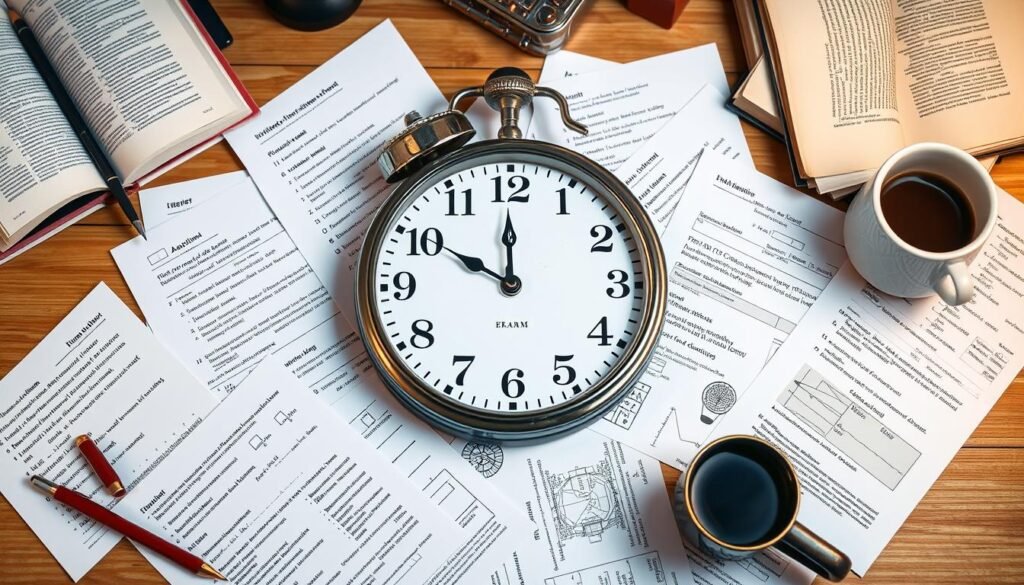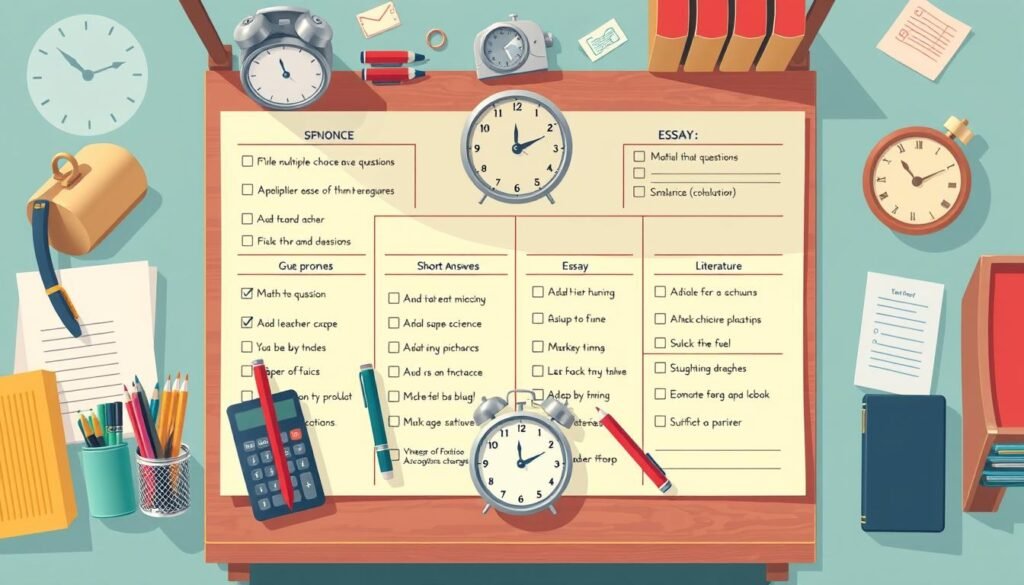Getting good grades often depends on avoiding Common Mistakes In Exam Papers. As a professional copywriter, I want to share the most common errors students make. I’ll also give you tips to beat them.
Also Read: Proven Best Revision Strategies For Exams
These mistakes include not preparing well, bad time management, and not understanding the exam format. This article will help you do better on tests and reach your academic goals.
Key Takeaways
- Effective study habits and active learning techniques are essential for exam readiness.
- Proper time management during both study and exams is crucial for success.
- Understanding exam formats and requirements can help you address questions accurately.
- Managing test anxiety and maintaining self-care contribute to optimal performance.
- Developing strong writing skills can elevate your responses in essay-based exams.
Lack of Preparation: The Foundation of Exam Success
Getting ready for exams is key to doing well in school. Making a good study plan and using active learning can really help. Practice tests let you get used to the exam’s style and content, making you feel more ready.
Also Read: Effective Time Management For Exams – Study Guide
Creating an Effective Study Schedule
Having a clear study plan is very important. Set aside specific times for each subject or topic. Break big tasks into smaller ones and aim for what you can do in each study session. Stay on track and don’t put off studying.
Active Learning Techniques
- Take detailed notes during your study sessions, actively engaging with the material.
- Regularly review your notes and ask questions to reinforce your understanding.
- Work through practice problems and exercises to apply the concepts you’ve learned.
Practice Test Strategies
Get used to the exam’s format and content with practice questions. Time yourself to get better at how fast you can answer questions. Look at how you did and see where you need to work harder. This will help you do well on the real test.
“Preparation is the key to success. Dedicate time to studying and practicing, and you’ll be well on your way to acing that exam.”
Remember, hard work and being proactive in your studies are the keys to success. By planning well, learning actively, and practicing, you’ll feel ready for your exams. You’ll reach your academic goals with confidence.
Also Read: Best Study Tips For Final Exams – Ultimate Guide
Time Management During Study and Exams

Managing your time well is key to doing well on exams. When you’re getting ready for exams, it’s important to focus on the tough subjects first. Don’t try to do too many things at once. Instead, focus on one thing at a time to get more done.
When you’re taking the exam, check how many questions and points each one is worth. Don’t waste too much time on questions that don’t have many points. Managing your time well can really help you do better.
Also Read: The Basics Of International Trade Law For Beginners
To get better at managing your time, try these tips:
- Prioritize Effectively: Figure out which subjects need more of your time. This way, you can use your study time wisely.
- Eliminate Distractions: Stay away from things that might distract you, like social media or emails. They can make it hard to focus.
- Break It Down: Break your study material into smaller parts. This makes it easier to handle and helps you stay focused.
- Take Breaks: Make sure to take breaks during your study time. Even short breaks can help you stay sharp and focused.
Learning to manage your time well will help you handle exam season better. You’ll feel more confident and ready to succeed.
| Exam Time Management Strategies | Benefits |
|---|---|
| Prioritize Challenging Topics | Ensures adequate time is dedicated to areas that require more attention |
| Avoid Multitasking | Increases focus and productivity during study sessions |
| Allocate Time Strategically | Helps maximize points by focusing on higher-value questions |
| Take Regular Breaks | Prevents burnout and enhances concentration and retention |
“Time is the most valuable thing a man can spend.” – Theophrastus
Common Mistakes In Exam Papers: Essential Guidelines

Doing well in exams is more than just studying hard. Knowing how to avoid common mistakes can help you get better grades. Here are some key tips to help you succeed in exams.
Also Read: Easy Tips For Understanding Cybersecurity Law
Misreading Question Instructions
Many students make the mistake of not reading the question instructions well. Make sure to read and underline the key words in each question. This helps you understand what the question is asking.
Being careful with this detail can greatly improve your answers. It ensures your responses are relevant and complete.
Poor Answer Planning
Planning your answers well is key to doing well in exams. Before you start writing, take a moment to plan out your response. This is especially important for essay questions.
Organizing your thoughts and structuring your answer can make your responses better. It improves the quality and flow of what you write.
Improper Time Allocation
Managing your time during exams is very important. Spend your time based on how many marks each question is worth. Make sure you give enough time to the questions that count the most.
Don’t waste too much time on easy questions. This can cost you on the harder ones.
It’s also important to give examples, data, or evidence to back up your answers. Avoid making general statements. Make sure your answers show you really understand the topic.
Always check your work for spelling and grammar mistakes. And, make sure your handwriting is easy to read. This makes your work look professional.
By being aware of these common mistakes and following these tips, you can improve your exam scores. This will help you achieve your academic goals.
Managing Test Anxiety and Stress

Test anxiety can really hold students back, affecting their grades and happiness. It often comes from fear of failing or feeling too much pressure. But, there are ways to tackle exam stress and anxiety reduction.
One key method is using relaxation techniques. For example, the 4-7-8 breathing method helps calm you down. You breathe in for 4 seconds, hold for 7, and breathe out for 8. It can make you feel more relaxed and focused.
- Staying consistent with studying and getting ready early can also help. By studying a bit each day and using good study methods, you can feel more confident and less anxious about exams.
- Living a healthy lifestyle is important too. Getting enough sleep, eating well, and exercising regularly can help reduce anxiety and improve your exam scores.
Don’t forget to reach out for help when you need it. Campus resources like tutoring, writing centers, and wellness programs can offer great support. They can help you manage your anxiety and find ways to cope.
“Addressing testing anxiety is crucial to maximizing academic achievement. People who are anxious may have reduced cognitive functioning, making it harder to remember things and demonstrate their true abilities.”
By using these strategies and taking advantage of campus resources, students can manage their exam stress and anxiety reduction. This can lead to better grades and a happier, healthier life.
Understanding Exam Format and Requirements

Knowing the exam structure is key to doing well in school. Get familiar with the different types of questions you might see. Each type needs its own study plan and time management strategy.
From multiple-choice to essay questions, understanding what to expect helps you study smarter. It lets you plan your time better and focus on what’s important.
Different Types of Exam Questions
Exams have many question types, each with its own challenges and benefits. Multiple-choice questions test if you can spot logical arguments. Short-answer questions check if you know the basics and can explain them briefly.
Essay questions require longer answers, showing off your critical thinking. Oral exams, often in language classes, test your speaking skills directly with the teacher.
Marking Scheme Analysis
It’s crucial to understand how points are given. Look at the marking scheme to see what the examiners want. Questions that are harder or more complex usually get more points.
Question Weight Distribution
Check how points are spread out in the exam. This helps you know where to focus your efforts. Questions that cover important knowledge should get more points than others.
Knowing the exam format, question types, and how points are given helps you study better. Practice with old exams to get used to the format. This way, you can prepare more effectively and feel confident on the day of the exam.
| Question Type | Description | Advantages | Disadvantages |
|---|---|---|---|
| Multiple-Choice | One stem question with multiple answer choices, including correct and incorrect options |
|
|
| Short Answer | Questions requiring concise responses, ranging from one-word to short explanations |
|
|
| Essay | Questions demanding more elaborate responses, testing higher-order thinking skills |
|
|
| Oral Exam | Direct interaction between students and instructors, assessing oral communication skills |
|
|
Also Read: Best Study And Exam Preparation Tips For Students
Self-Care and Physical Preparation
Being ready for an exam is more than just studying. It’s also about taking care of your health and mind. A routine that includes relaxation, exercise, and a healthy diet can really help your exam score.
Make sure to get enough sleep to improve your focus and memory. Try to sleep 7-9 hours each night before the exam. Eating well and staying hydrated is also key for your brain. Even a short walk can help reduce stress and keep you focused.
It’s also important to stay connected with friends and do things that relax you. Don’t cram all your studying into one night. Instead, stick to a regular study plan and get enough rest. Taking care of your body and mind will help you feel more confident and ready for the exam.
FAQs
Q: What are some silly mistakes that students make in exam papers?
A: Some of the silliest exam mistakes include misreading questions, not following instructions, and making careless errors in calculations or spelling. These mistakes often lead to lost marks that could have been easily avoided.
Q: How can poor time management lead students to run out of time during exams?
A: Poor time management can cause students to spend too long on difficult questions or to rush through easier ones. This can result in running out of time to finish a paper, leaving some questions unanswered.
Q: What is a good exam technique to avoid mistakes when answering a question?
A: A good exam technique includes reading the question properly before answering, managing time effectively, and ensuring clarity in responses. It is important to understand what the question is asking to avoid making mistakes.
Q: How can high school students prepare for multiple choice questions?
A: High school students can prepare for multiple choice questions by practicing with past exam papers, revising key concepts, and learning to eliminate incorrect answers, which increases the chances of selecting the correct answer.
Q: What should students do when they encounter difficult questions in the exam room?
A: When facing difficult questions in the exam room, students should skip them temporarily and return if time permits. This strategy helps to manage time effectively and ensures they can answer easier questions first.
Q: Why is reading the question properly so important during exams?
A: Reading the question properly is crucial because it ensures that students understand what is being asked. Misinterpretation can lead to answering the wrong question or missing out on key details that could earn extra marks.
Q: What are some common mistakes that students make when writing an essay?
A: Common mistakes in essay writing include failing to structure the essay properly, neglecting spelling and grammar, and not addressing the essay prompt fully. These issues can significantly affect the overall score.
Q: How can students avoid rushing to finish a paper and making errors?
A: Students can avoid rushing by practicing good time management, allocating specific time for each question, and maintaining a steady pace throughout the exam. Regular practice can also help build confidence and reduce the urge to rush.
Q: What is one of the worst things students can do during exams?
A: One of the worst things students can do during exams is to panic and allow stress to affect their performance. Staying calm and focused helps in applying good exam techniques and minimizes the chances of making silly mistakes.
Source Links
- https://www.youthemployment.org.uk/common-mistakes-to-avoid-during-exams-and-final-assessments/
- https://www.superprof.com/blog/common-exam-mistakes-students-make/
- https://missioncollege.edu/depts/math/math-help/math-tests/test-taking-errors.html
- https://mathnuggets.sg/how-to-avoid-mistakes-in-exams/
- https://oeshighschool.com/10-common-mistakes-students-make-during-exams-and-how-to-avoid-them/
- https://www.oxford-royale.com/articles/managing-time-exam/
- https://irainbow.co.za/common-mistakes-that-learners-make-during-an-examination/
- https://creatingpositivefutures.com/10-common-mistakes-students-make-when-studying-for-exams/
- https://www.latrobe.edu.au/mylatrobe/7-common-mistakes-to-avoid-during-final-assessments/
- https://www.colorado.edu/health/blog/test-anxiety
- https://hallmark.libguides.com/c.php?g=1374338
- https://learningcenter.unc.edu/tips-and-tools/tackling-test-anxiety/
- https://www.cmu.edu/teaching/assessment/assesslearning/creatingexams.html
- https://uwaterloo.ca/centre-for-teaching-excellence/catalogs/tip-sheets/exam-questions-types-characteristics-and-suggestions
- https://headspace.org.au/explore-topics/for-young-people/prepare-for-exams/
- https://www.anxietycanada.com/sites/default/files/Test_Anxiety_Booklet.pdf
- https://empowerly.com/college-guidance/applications/exams/how-to-study-effectively-for-exams-in-a-short-time





